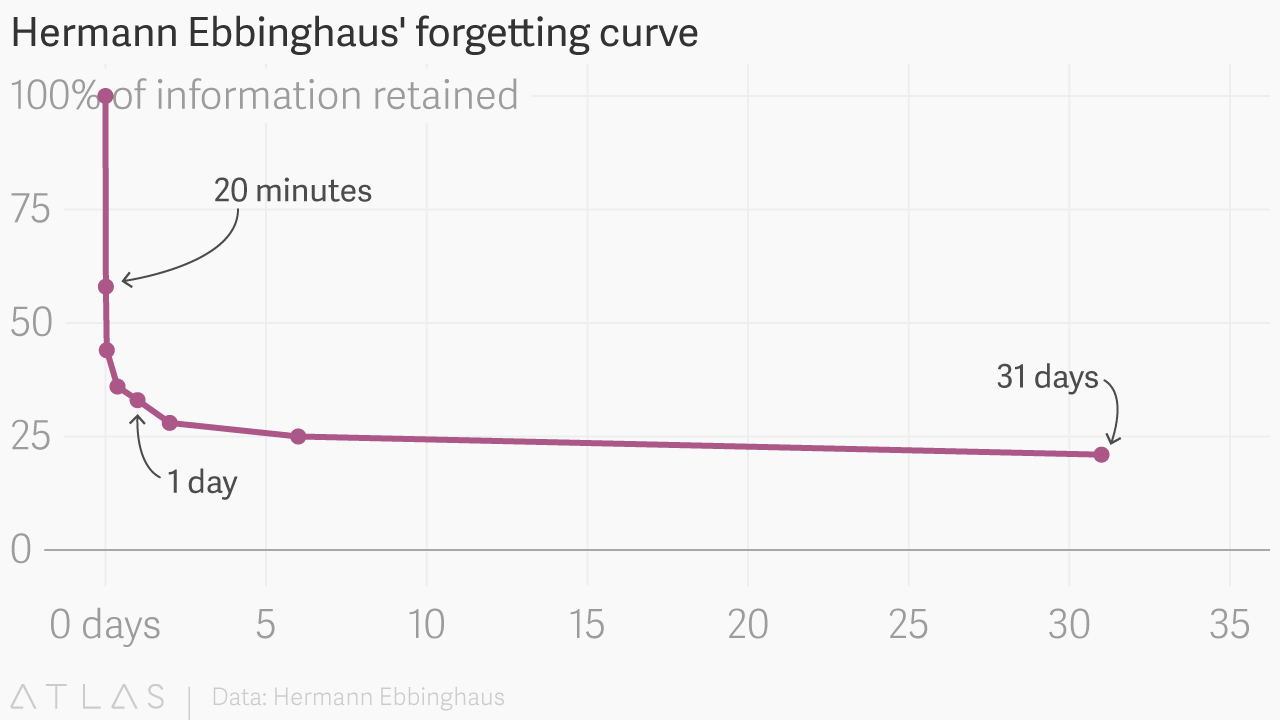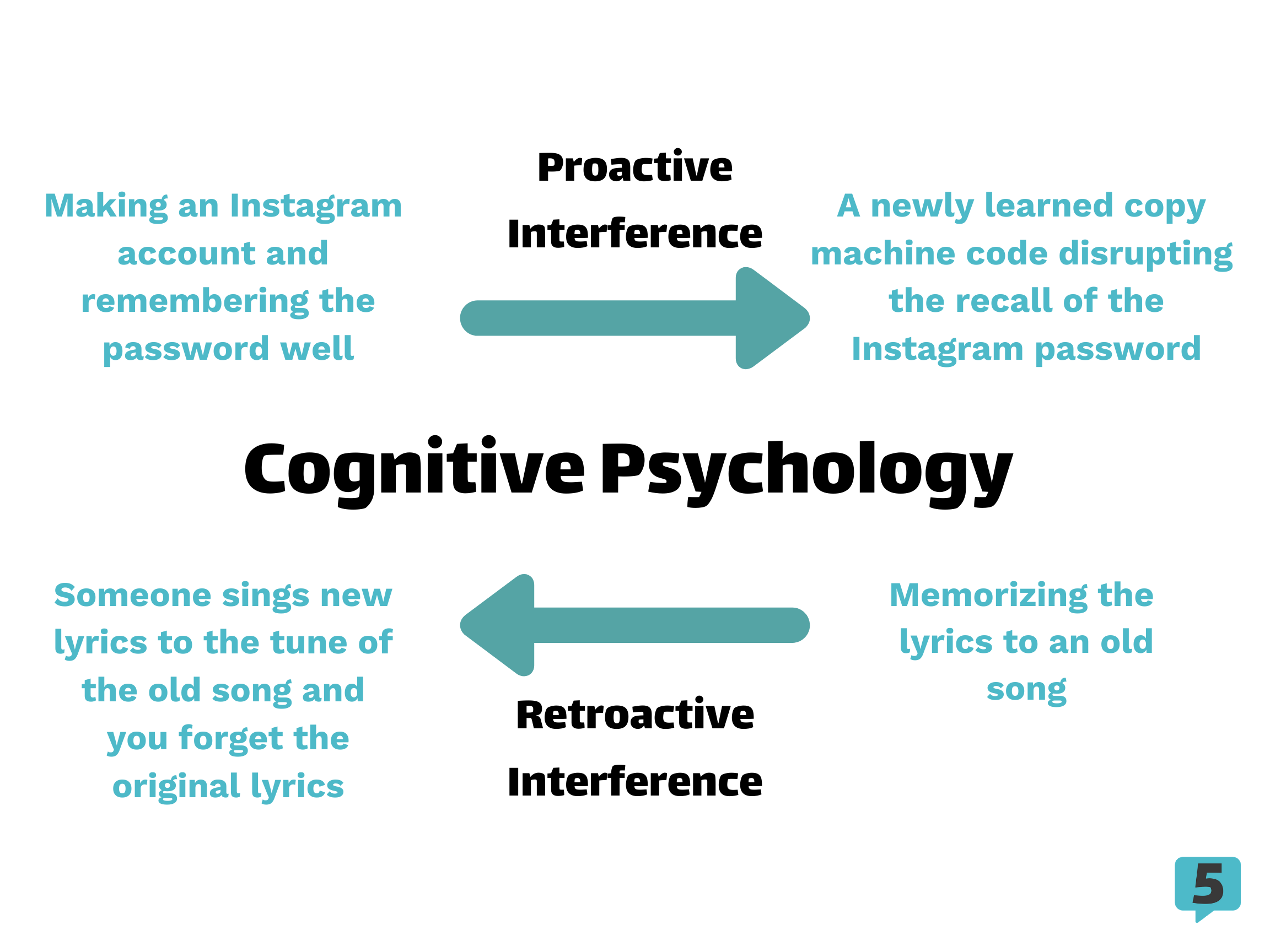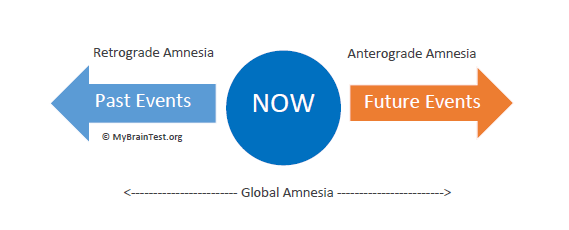5.5 Forgetting and Memory Distortion
4 min read•december 22, 2022
Dalia Savy
Sadiyya Holsey
Haseung Jun
Dalia Savy
Sadiyya Holsey
Haseung Jun
AP Psychology 🧠
334 resourcesSee Units
No matter how much information we try to memorize, we always forget something. It's so frustrating, especially when studying for a test. The cool thing about this unit is that you could learn some tips on how to strengthen your memory and consolidate content when studying!
Ebbinghaus Curve
Hermann Ebbinghaus is one of the psychologists most known for studying human memory. He eventually came up with something called the forgetting curve.

Image Courtesy of Quartz.
This curve shows that you forget about 75% of the information you learn in one day (without relearning/rehearsing). Eventually, this curve levels off. He is also the one that figured out the ways you can help improve your memory, which we sort of discussed a little in the previous topic. Here is a quick list:
- 🔁Rehearsal—The more you rehearse the information, the less you forget overtime.
- 🕒Time Spent—The more time you spend time memorizing content, the less you forget / need to relearn.
- 📅Spacing Effect—Space out your learning rather than cramming.
- 🧠Overlearning—If you continue reviewing content after you already memorized it, you are less likely to forget it.
- ✍️Testing Effect—Quiz yourself rather than just reading the information on your test over and over again.
Memory Interference
Sometimes, you may forget something because another piece of information gets in the way! 🤦
Retroactive Interference
Retroactive interference is when it becomes harder to recall old information because of learning new information.
An example of this is switching your password from Psych2020 to Psych#2021 and then not being able to recall your old password.
New information blocks old
Proactive Interference
Proactive interference is when it becomes harder to recall new information because of old information in the past. The old information affects the ability to learn new information.
Using the passwords idea above, you may only remember Psych!2020 and cannot recall your new password, Psych#2021, because of the old.
Old information blocks new

💭In an FRQ about one of these two terms:
- Clearly specify what the new information is and what the old information is.
- To indicate interference occurring, use the words blocking or preventing. This really shows your understanding of the terms.
Amnesia
Amnesia is another reason why you might not remember something. It is the inability to remember past memories/events and there are different types of amnesia!

Image Courtesy of Tenor.
Retrograde amnesia
Retrograde amnesia occurs when someone is unable to recall their most recent memories/their general past.
Usually, this sort of amnesia occurs after an emotional or physically traumatic event because there are some details from the event that the victim might not want to remember.
Anterograde amnesia
Anterograde amnesia is when an individual is unable to form new memories. Past memories (long term) can still be recalled, but we have no awareness of it.

Image Courtesy of Memory Health Tests.
In an FRQ about these terms, be sure to mention brain illness or injuries.
Source amnesia
Source amnesia, also called misattribution error, is the inability to remember how you learned previously acquired information. For example, some people won't remember if they heard a joke they made repeated back to them.
Source amnesia could also refer to not remembering where you heard about/imagined/experienced something. This happens a lot. You know how in movies, songwriters often unintentionally plagiarize and say they've never heard of the other source? This is source amnesia in action!
Deja Vu
Deja vu is a false sense when you feel that you experienced a situation before.
Misinformation Effect
Human memory is not perfect. To illustrate, crime scene eyewitnesses often remember events and the characteristics of people incorrectly, even though they might have witnessed the crime and saw the perpetrator.
The misinformation effect states that a person’s recall of an event is negatively impacted and becomes less accurate due to information after the event. After the event occurs, you might incorporate some inaccurate information about what occurred, influencing attitudes and behaviors.
This was studied by Elizabeth Lotus and led to therapists leading with the question: "What happened?" If a therapist were to ask something specific to the situation and assume something, false information may peep into the person's memory.
Freudian Thinking
Freud believed that we may purposely repress memories and forget them. He called this motivated forgetting. Motivated forgetting could be either conscious or unconscious in order to shy away from unacceptable behaviors or painful memories.
Repression is one of the defense mechanisms in Freud's psychoanalytic theory. Defense mechanisms protect our self-concepts and attempt to minimize the anxiety we feel about a subject.
To learn more about errors in thinking, read Bias and Errors of Thinking.
🎥Watch: AP Psychology—Cognition + Thinking
Browse Study Guides By Unit
🔎Unit 1 – Scientific Foundations of Psychology
🧠Unit 2 – Biological Basis of Behavior
👀Unit 3 – Sensation & Perception
📚Unit 4 – Learning
🤔Unit 5 – Cognitive Psychology
👶🏽Unit 6 – Developmental Psychology
🤪Unit 7 – Motivation, Emotion, & Personality
🛋Unit 8 – Clinical Psychology
👫Unit 9 – Social Psychology
✏️Frequently Asked Questions
🧐Multiple Choice Questions (MCQ)
✍️Free Response Questions (FRQ)
📆Big Reviews: Finals & Exam Prep

© 2023 Fiveable Inc. All rights reserved.